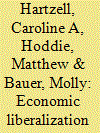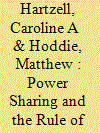| Srl | Item |
| 1 |
ID:
138420


|
|
|
|
|
| Summary/Abstract |
Although there is now a wealth of scholarship concerning the onset, duration, and termination of civil wars, there is not nearly as much empirical research by political scientists on the potential for postconflict democratization in countries that have been the site of civil wars. This relative scholarly neglect of post–civil war democratization stands in contrast to the efforts and resources that other actors—foreign ministries, international and nongovernmental organizations, and members of civil society—have invested in attempting to help construct democracy in postconflict states such as Indonesia, Liberia, and Uganda.
|
|
|
|
|
|
|
|
|
|
|
|
|
|
|
|
| 2 |
ID:
095027


|
|
|
|
|
| Publication |
2010.
|
| Summary/Abstract |
Previous studies that have explored the effects of economic liberalization on civil war have employed aggregate measures of openness and have failed to account for potential endogeneity bias. In this research note, we suggest two improvements to the study of the relationship between liberalization and civil war. First, emphasizing that it is processes that systematically create new economic winners and losers rather than particular levels of economic openness that have the potential to generate conflict, we consider the effects of one oft-used means of liberalizing economies: the adoption by countries of International Monetary Fund (IMF) structural adjustment programs. Second, we use a bivariate probit model to address issues of endogeneity bias. Analyzing all data available for the period between 1970 and 1999, we identify an association between the adoption of IMF programs and the onset of civil war. This finding suggests that IMF programs to promote economic openness unintentionally may be creating an environment conducive to domestic conflict.
|
|
|
|
|
|
|
|
|
|
|
|
|
|
|
|
| 3 |
ID:
168553


|
|
|
|
|
| Summary/Abstract |
What effect do power-sharing institutions agreed to as part of civil war settlements have on the development of the rule of law in post–civil war states? We contend that power-sharing measures facilitate the emergence of the rule of law in two ways. First, they establish a form of institutional constraint that promotes judicial autonomy and independence. Second, they foster a sense of security among judges and other political actors that bolsters commitment to the law. We demonstrate the plausibility of a positive relationship between power sharing and the rule of law through an analysis of post–civil war states between the years 1948 and 2006. Our findings suggest that civil war settlements can help to establish the rule of law when they include mechanisms aimed at allaying the insecurities of political actors in the postconflict environment.
|
|
|
|
|
|
|
|
|
|
|
|
|
|
|
|